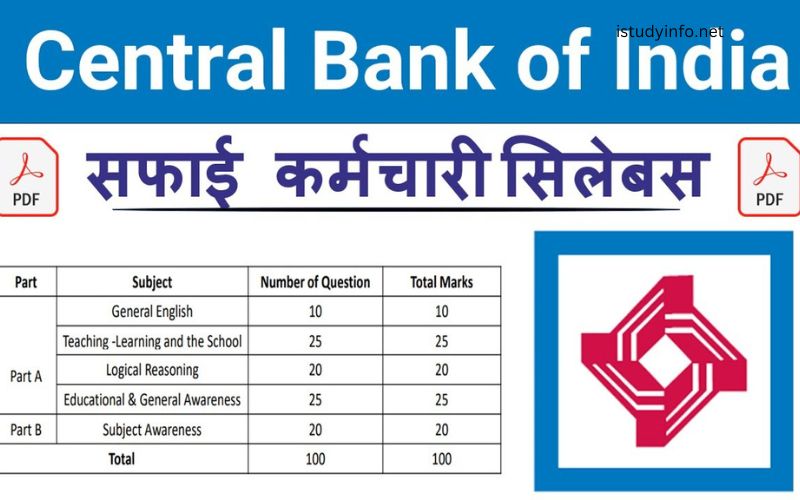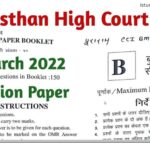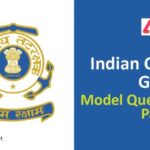The Central Bank of India, one of the oldest and largest commercial banks in India, periodically recruits Safai Karamcharis (cleaning staff) to maintain cleanliness and hygiene in its branches and offices. The recruitment process includes a structured syllabus and examination designed to evaluate the candidates’ basic skills and knowledge necessary for the role. This article delves into the details of the Central Bank of India Safai Karamchari syllabus, offering insights into its structure, preparation tips, and other essential information for aspiring candidates.
Overview of the Recruitment Process
Before diving into the syllabus, it is essential to understand the recruitment process for the Safai Karamchari position at the Central Bank of India. The process generally includes:
- Application Submission: Candidates submit their applications online or offline as per the instructions in the official notification.
- Eligibility Check: Applications are screened to ensure candidates meet the basic eligibility criteria such as age, educational qualifications, and experience.
- Written Examination: Eligible candidates are called for a written examination to test their basic skills and knowledge.
- Interview: Successful candidates from the written exam may be called for an interview or practical test.
- Final Selection: Based on performance in the written exam and interview, the final list of selected candidates is prepared.
Detailed Syllabus for Safai Karamchari Examination
The written examination for the Safai Karamchari position is designed to assess the candidate’s proficiency in various basic skills essential for the job. The syllabus typically includes the following sections:
- General Knowledge
- General Awareness
- Elementary Mathematics
- Basic English
1. General Knowledge
This section tests the candidate’s awareness of their surroundings and general happenings. Key topics include:
- Current Affairs: Important national and international events, awards, sports, and personalities.
- History and Culture: Basic knowledge of Indian history, cultural heritage, significant historical events, and freedom movements.
- Geography: Basic geographical knowledge of India and the world, including physical features, climate, and major cities.
- Science and Technology: Fundamental concepts of science, latest technological advancements, and their applications.
- Environmental Awareness: Issues related to environment, pollution, conservation efforts, and sustainability.
Preparation Tips:
- Regularly read newspapers and magazines.
- Use general knowledge books and online resources.
- Watch news channels and follow reliable news websites.
2. General Awareness
This section is designed to evaluate the candidate’s understanding of their immediate environment and their application to society. It includes:
- Banking Awareness: Basic understanding of banking terms, functions of banks, financial institutions, and current banking trends.
- Indian Economy: Overview of the Indian economy, economic policies, and major economic developments.
- Government Schemes: Awareness of various government schemes and initiatives for social and economic welfare.
- Social Issues: General awareness about social issues, public health, and sanitation.
Preparation Tips:
- Stay updated with the latest economic news and banking trends.
- Study government publications and reports on economic policies.
- Be aware of major social issues and government schemes.
3. Elementary Mathematics
This section tests the candidate’s basic mathematical skills and numerical ability. Topics covered include:
- Number System: Understanding of integers, fractions, decimals, and operations on numbers.
- Arithmetic: Basic arithmetic operations, percentages, ratios, and proportions.
- Algebra: Simple equations, expressions, and algebraic identities.
- Geometry: Basic geometrical concepts including lines, angles, shapes, and area calculation.
- Data Interpretation: Reading and interpreting data from charts, graphs, and tables.
Preparation Tips:
- Practice basic arithmetic and algebra problems regularly.
- Use standard textbooks and online resources for elementary mathematics.
- Solve previous year’s question papers and mock tests.
4. Basic English
This section evaluates the candidate’s proficiency in basic English language skills. Key areas include:
- Vocabulary: Understanding and usage of common words, synonyms, antonyms, and idioms.
- Grammar: Basics of English grammar including parts of speech, tense, voice, and sentence structure.
- Comprehension: Ability to read, understand, and interpret written texts.
- Writing Skills: Basic writing skills, including sentence formation and simple paragraph writing.
Preparation Tips:
- Read English newspapers, books, and magazines to improve vocabulary and comprehension.
- Practice grammar exercises from standard English grammar books.
- Write short essays and paragraphs to enhance writing skills.
Additional Preparation Strategies
To excel in the Safai Karamchari examination, candidates should adopt a structured preparation strategy. Here are some additional tips:
- Create a Study Plan: Develop a realistic study plan covering all the sections of the syllabus. Allocate time for each subject and stick to the schedule.
- Practice Regularly: Regular practice is crucial, especially for mathematics and English. Solve practice papers and take mock tests to assess your progress.
- Stay Updated: Keep yourself updated with current affairs and general knowledge by reading newspapers, watching news channels, and using mobile apps.
- Use Reliable Resources: Use standard textbooks, online courses, and other reliable study materials for preparation.
- Join Study Groups: Join study groups or forums to discuss topics, share knowledge, and clarify doubts.
- Stay Healthy: Maintain a healthy lifestyle, eat nutritious food, and get adequate rest to keep your mind and body fit for preparation.
Importance of the Role
The role of a Safai Karamchari is crucial in maintaining the cleanliness and hygiene of the bank’s premises. Clean and well-maintained branches not only create a positive environment for customers and employees but also reflect the bank’s commitment to providing excellent services. The duties of a Safai Karamchari include:
- Sweeping and mopping floors
- Cleaning windows, doors, and furniture
- Disposing of waste and maintaining cleanliness in washrooms
- Ensuring proper sanitation and hygiene standards
- Assisting in basic maintenance tasks as required
Given the importance of this role, the Central Bank of India ensures that candidates are thoroughly evaluated to select the most suitable individuals.
Conclusion
The Central Bank of India Safai Karamchari syllabus is designed to assess the fundamental skills and knowledge required for the role. By covering areas such as general knowledge, general awareness, elementary mathematics, and basic English, the examination ensures that candidates are well-rounded and capable of performing their duties effectively. Proper preparation, regular practice, and staying updated with current affairs are key to succeeding in this examination.
Aspiring candidates should approach their preparation with dedication and a positive mindset, understanding the significance of their role in maintaining the bank’s reputation and service quality. With the right strategy and resources, candidates can excel in the examination and secure a position as a Safai Karamchari at the Central Bank of India.
















